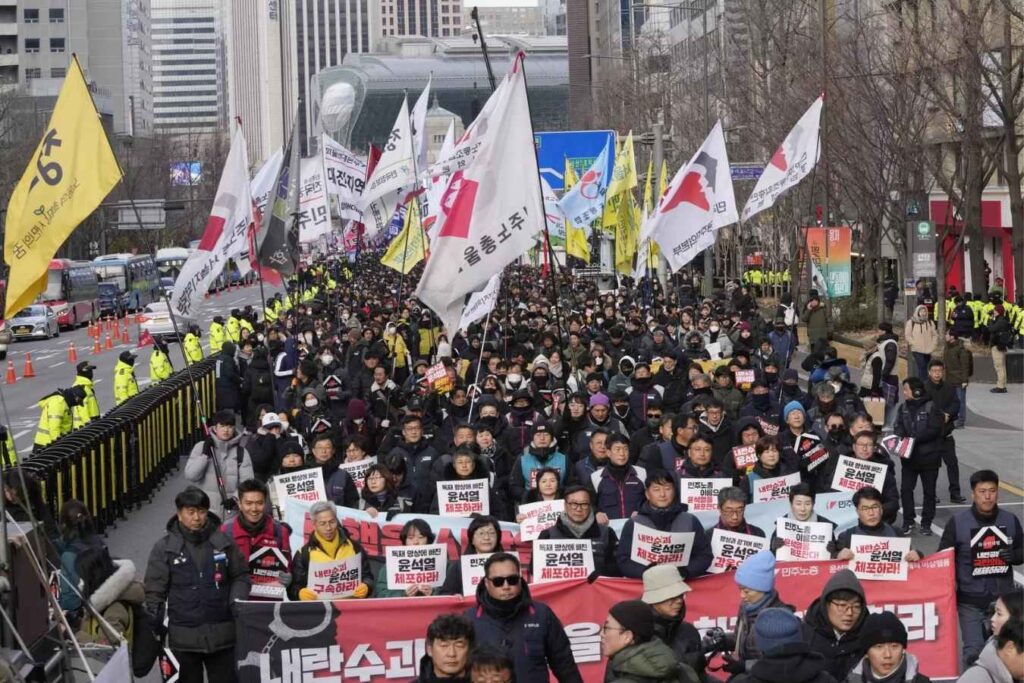South Korea’s political landscape experienced a dramatic turn on Saturday as lawmakers voted to impeach President Yoon Suk Yeol. The decision came after Yoon’s brief declaration of martial law earlier this month, which stunned the nation and sent shockwaves through its democratic institutions. His move to impose martial law was widely viewed as an attempt to muzzle an opposition-controlled National Assembly, raising serious concerns both domestically and abroad.
The Impeachment Vote and Immediate Consequences
A total of 204 legislators voted in favor of impeachment, surpassing the required two-thirds majority in the 300-seat National Assembly. Notably, a dozen members of Yoon’s own conservative People Power Party joined opposition lawmakers in backing the motion. Their support signaled that Yoon’s actions had simply become too controversial to defend.
This vote means Yoon’s presidential powers are suspended as soon as he receives the official impeachment notice. In the interim, Prime Minister Han Duck-soo will assume the role of acting president. Meanwhile, South Korea’s Constitutional Court now has up to 180 days (six months) to review the impeachment case. If it confirms the legislature’s decision, the country will hold a snap election to choose a new leader.
Public Reaction and the Streets of Seoul
Outside the National Assembly in Seoul, a large crowd of protesters cheered and celebrated, reflecting a sense of relief and victory. Some had organized free coffee and food stalls to sustain fellow demonstrators, symbolizing a communal effort to uphold democratic principles. “This is a triumph of democracy and of the South Korean people,” said Park Chan-dae, an opposition party floor leader, shortly after the historic vote.
Also Read

Why Yoon’s Party Broke Ranks
Until recently, many within Yoon’s own party had resisted impeachment, opting instead for a strategy of seeking his “orderly resignation.” However, a series of alarming revelations emerged, contradicting Yoon’s assertion that his martial law declaration on December 3 was only intended as a symbolic gesture.
- Planning and Intent:
Leaked documents obtained by an opposition lawmaker, Choo Mi-ae, indicated that preparations for martial law had been underway for at least a month. Evidence suggested that the military had considered medical facilities in anticipation of possible violence, and a senior officer claimed he was given a list of politicians to arrest. - Direct Orders and Testimony:
Lt. Gen. Kwak Jong-keun, who led the special forces unit that stormed the National Assembly, testified that Yoon personally ordered him to prevent 150 lawmakers—just enough to overturn the martial law—from assembling. Such an action violates the constitution, which grants the legislature the authority to revoke martial law with a simple majority vote. Indeed, lawmakers did just that in the early hours of December 4.
Yoon and several of his allies now face investigations related to insurrection. A travel ban has reportedly been imposed on some of them, further heightening legal and political pressures. Just last weekend, Yoon narrowly avoided impeachment, clinging to power despite growing calls for him to step down. The tide has now turned decisively against him.
Next Steps: Prime Minister Takes the Helm, Court to Decide
With Yoon’s powers suspended pending the Constitutional Court’s review, Prime Minister Han Duck-soo will serve as acting president. This period gives the country a semblance of stability while the judiciary evaluates the merits of the impeachment. If the court upholds the legislature’s move, Yoon will be permanently removed from office, paving the way for an early presidential election.
For South Korea, this is a pivotal moment. It shows the nation’s democratic institutions at work, even under extreme pressure. As the country awaits the Constitutional Court’s ruling, one thing is clear: The principles of accountability and the rule of law remain strong forces in the heart of Korean democracy.






